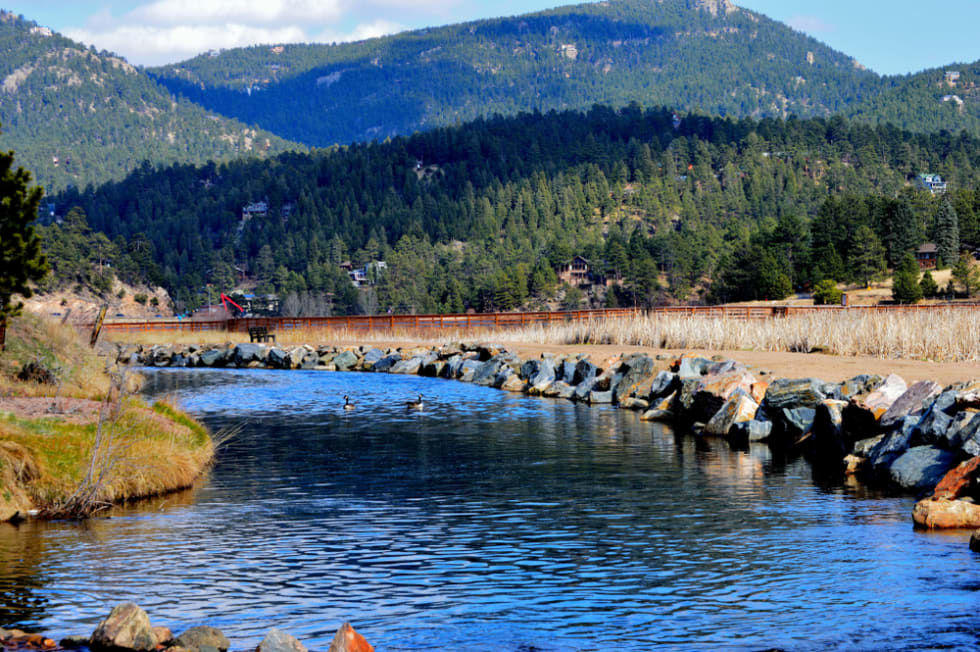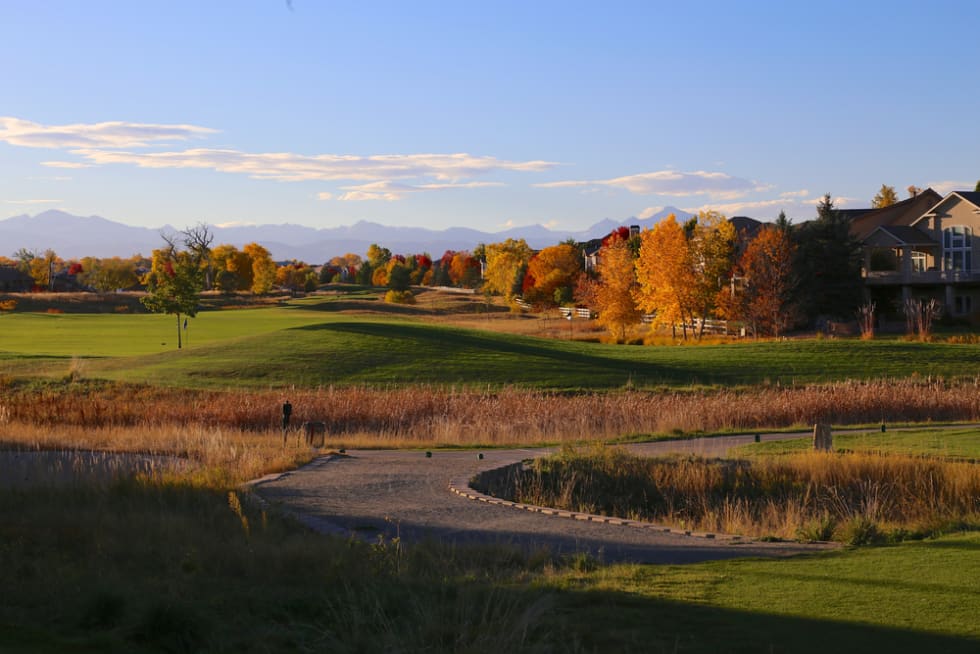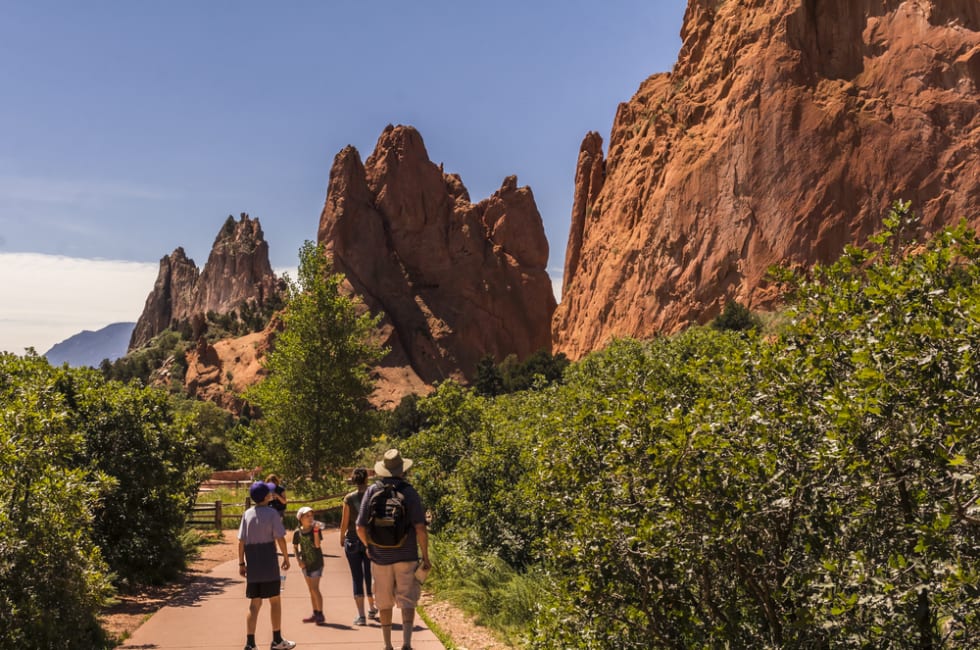- 155 units available
- Studio • 1 bed • 2 bed • 3 bed
- Amenities
In unit laundry, Nest technology, Patio / balcony, Granite counters, Hardwood floors, Dishwasher + more

Colorado’s blend of history, gorgeous landscape, and booming economy make it a desirable place to call home. The statehood dates back 100 years before the signing of the US Declaration of Independence. Many refer to it as "Colorful Colorado" for its pristine mountains, plains, and river scenery, attracting newcomers and visitors year-round.
Colorado's booming economy, cultural offerings, and magnificent landscape make it an attractive option for college students, families, and retirees looking for a desirable place to live, work, and play. From bustling cities to sleepy mountain towns, Colorado offers something for everyone.
Before packing up and moving to the Centennial State, here's what you need to know about living in Colorado.
Colorado has the highest mean elevation of any state, boasting over 1,000 Rocky Mountain peaks. Rich in natural resources, the state also holds the record of the world's largest silver nugget weighing in at 1,840 pounds that was discovered in 1894 near Aspen! You can warm up during Colorado winter among the world's largest and deepest natural hot springs.

While it doesn't border the most number of states in the U.S., it does share borders with seven other states, making Colorado a very convenient place to live and work. Colorado touches Utah, Arizona, New Mexico, Nebraska, Wyoming, Kansas, and Oklahoma. Colorado is also celebrated as one of the Mountain States, with about half of its land lying in the Rocky Mountains.
The most populous city in Colorado is Denver, which is also the state capital. Colorado Springs, Aurora, Fort Collins fall next in line behind Denver for the state's largest populations. There are also plenty of small towns to call home and enjoy the great outdoors in Colorado, making the entire state a desirable place to settle.
The cost of living is on the rise as Colorado's population continues growing. It's more expensive than surrounding states but is still cheaper than living in California. Denver's urban neighborhoods are also less expensive than cities like San Francisco, New York City, and Chicago.
Rents and housing were once reasonable throughout Colorado, but its biggest cities are now higher than the national average. The median rent in Denver is now $1,838 for a one-bedroom apartment, while the median rent on a two-bedroom is $2,466.
If Denver is outside of your budget, there are less expensive cities to choose from. The median rent in Colorado Springs is now $1,411, while a two-bedroom is $1,700.
While cost of living is on the rise, the good news is the average income in Colorado is higher than the national average. The United States Census Bureau reports the median income in Colorado is $87,598. By comparison, the median household income is $75,149 in the rest of the country.

Colorado's total population is 5,877,610, and between 2010 and 2021, it shouwed a nearly 80k+ increase in newcomers. Apartment List's most recent migration report shows that the highest share of people moving to Denver, Colorado are from Dallas, New York and Boulder. Renters currently living in the Denver area want to stay in Colorado but are considering moving to Colorado Springs, Kansas City, and Boulder.
Job seekers are at an advantage in The Centennial State, as Colorado's job market has been strong in recent years. It's employment rates have been higher than the U.S. average since 2022, which is no surprise since Colorado is home to several significant corporations, including Lockheed Martin, Kaiser Permanente, and CenturyLink. The Denver International Airport is among the biggest employers in the state. The manufacturing industry is among the chief drivers of Colorado's economy, along with mining, agriculture, and tourism.
Colorado is walkable and bikeable, depending on the city and neighborhood you choose. Downtown Denver and Boulder are among the most walkable cities in the state, provided you stick near its urban cores.
Colorado locals love being outdoors, and biking is a popular pastime. The League of American Bicyclists says Colorado offers more gold and platinum-rated bicycle communities than any other state. Boulder, Fort Collins, Breckenridge, Durango, Crested Butte, and Steamboat Springs are the most bikeable cities.
The good news is if you choose a city in Colorado that isn't as bikeable and walkable as you like, you're never far from trails, state, and national parks.
Colorado's cities offer public transportation, with Denver's Regional Transportation District (RTD) being the largest in the state. The system features 170 bus routes, 12 rail lines, and specialty services. Fare prices start at $2.80 and go up to $114 for daily rides.
Transportation costs are reasonable throughout Colorado, especially if you plan to live in an urban Downtown neighborhood.. Expect to pay $4,900 for one working adult with no children and $11,186 for two working adults with one child.

Despite Colorado’s snowy reputation, the weather is quite temperate. Summers are hot in Colorado, while winters tend to be cold and dry. Locals can expect partial cloud coverage with temperatures ranging from 22°F to 89°F, depending on the season. Despite the clouds drifting across the state, Denver still ranks as one of the sunniest cities in the country, though if you settle into the mountains, you're likely to experience more cold and snow than in other areas.
The biggest draw to Colorado is its pristine outdoors, which beckons hikers, skiers, and nature enthusiasts. Rocky Mountain National Park is among the most popular attractions in the state and is located near Estes Park. You can enjoy more than 100 peaks, diverse wildlife, and alpine lakes. Whether you are interested in hiking, camping or stargazing, this national park has something for you. If you need ideas, check out the best things to do in Rocky Mountain National Park.
For the state’s best ski resorts, locals and global visitors head to Vail or Aspen. The city's capital of Denver also attracts visitors to the Denver Botanic Gardens and the Denver Art Museum. Denver's Union Station and downtown area boasts restaurants, live performances, and shopping in a historic depot dating back to 1800, and it was once the largest building in the West.
Colorado is a haven for foodies looking for farm fresh favorites and upscale, fusion cuisines. Food and nightlife are seemingly endless in Denver, with favorites like the Denver Union Station and The Cooper Lounge.
Farm-fresh foods at Jessup Farm attract Fort Collins Locals, while many turn to The Farmhouse for seasonal fare. The city is also home to the Anheuser-Busch and New Belgium Brewing companies, which lend to the city's laid-back vibe. Boulder is a perfect place to find food trucks lined against a backdrop of the Rockies or beer from Bohemian Biergarten in downtown Boulder.
While Denver's party scene is everything you would expect from a major city, it's actually night hiking that best represents the state. Night hiking is a unique pastime in Colorado, with star-filled trails at Lookout Mountain Park, Red Rocks Amphitheatre, and Eldorado Canyon State Park. Some parks offer moonlit hikes or are open after the sunsets. Make sure you plan accordingly before you go.
If you're looking for a more traditional night life, though, the Denver bustling with everything from laid-back lounges to nightclubs, such as Milk and Ophelia's Electric Soapbox. With so many breweries to choose from in the state, such as The Telluride Brewing Co. and Pikes Peak Brewing in Downtown Colorado Springs, your beer choices are almost endless.

Year-round events draw visitors from around the country and keep locals busy. For a splash of color, Crested Butte is the wildflower capital of the state, with an annual festival to honor it. Music fans celebrate against Telluride’s mountain backdrop during its summer Bluegrass Festival. Gorgeous sunsets and cool evenings are perfect for watching the sky come alive at the Telluride Balloon Festival.
Georgia isn't the only state to boast delicious peaches, as you can get your fill at the Palisade Peach Festival for fresh fruit, live performances, and local vendors. For more food options, a Taste of Colorado is a must for foodies in Downtown Denver.
Colorado loves its sports, and Denver holds the unique distinction of being the smallest city in the country with five major professional sports teams. Locals root for the Denver Broncos, Denver Nuggets, Colorado Rockies, Colorado Avalanche, and the Colorado Rapids.
The Colorado Springs-based Rocky Mountain Vibes and the Grand Junction Rockies keep minor league crowds entertained. Beyond the major sports franchises, you'll find PGA tournaments in Castle Rock and NASCAR races at the Colorado National Speedway.
Colorado attracts new college students and up-and-coming graduates looking for world-class education in a state known for its great outdoors. The University of Denver, Colorado School of Mines, University of Colorado Boulder, and Colorado State University offer undergraduate and graduate degrees. Students hike, bike, or explore cities like Denver to hit the pubs and soak up the nightlife in between classes.

Colorado is such a spectacular state that it can be tough to decide where to call home. Here, we did the research for you on which cities to consider:
Denver is a popular option for Millenials and job seekers thanks to its growing tech scene and a low unemployment rate. The city is also a top place for remote workers, ranked #8 of our best cities for remote workers.
Boulder features all the sparkling views you could want and is a hotbed for entrepreneurship. The city dons the title of America's Startup Capital and has created a strong economy, and the University of Colorado also fuels the startup culture and unique vibe.
While Colorado may be an expensive place to live, there are still plenty of more affordable options. Consider these two, and then check out our best places to live in Colorado guide for more!
If Denver and Boulder rent prices make you cringe, consider Colorado Springs as an alternative. The cost of living is lower without compromising on the amenities and perks that rival Denver and Boulder.
Home to Colorado State University, Fort Collins is another excellent option for city-living with a small-town feel. People are big CSU Rams fans in this town, and the University is one of the city's top employers. This city is a definite college town with a vibe to match.
Need more ideas? Learn more about the best places to live in Colorado.
Ready to move to Colorado? Find your next apartment with the Apartment List by taking our easy quiz to help you get matched with great options, or simply browse available Colorado listings.
Summers are hot in Colorado, while winters tend to be cold and dry. Locals can expect partial cloud coverage with temperatures ranging from 22°F to 89°F, depending on the season. Despite the clouds drifting across the state, Denver still ranks as one of the sunniest cities in the country.
Colorado’s time zone is Mountain Standard/Daylight Time (MST and/or MDT), depending on the time of year. It is also Greenwich Mean Time - 6 (GMT-6), two hours behind New York City.
Colorado’s biggest draw is its pristine outdoors, beckoning hikers, skiers, and nature enthusiasts. Rocky Mountain National Park is among the most popular attractions in the state and is located near Estes Park. Locals and global visitors head to Vail or Aspen for the state's best ski resorts.
Colorado is a city within the Mountain States Region of the United States.
Colorado's booming economy, cultural offerings, and magnificent landscape make it an attractive option for college students, millennials, and retirees looking for a desirable place to live, work, and play. In short, moving to Colorado offers tons of benefits!
The pros of living in Colorado include the beer, active lifestyle, climate and weather, and low cost of living. The cons of living in Colorado include the traffic, limited public transportation, high altitude, and being landlocked. Every city has its pros and cons.
The four best neighborhoods in Colorado are Denver, Boulder, Colorado Springs, and Fort Collins.
Colorado’s blend of history, gorgeous landscape, and booming economy make it a desirable place to call home. The growing job market and world-class urban amenities fuel Colorado’s rank as the second-fastest growing state in the country. And unlike other states where one season is usually revered above others, people love the snow, sunshine, and fall foliage with year-round access to the mountains.
Boasting a flat income rate of 4.63%, Colorado has one of the lowest sales taxes in the country at 2.9%, compared to the US average sales tax rate of 7.3%.
Colorado is home to several major corporations, including Lockheed Martin, Kaiser Permanente, and CenturyLink. The Denver International Airport is among the biggest employers in the state. The manufacturing industry is among the chief drivers of Colorado's economy, mining, agriculture, and tourism.
The University of Denver, Colorado School of Mines, University of Colorado Boulder, and Colorado State University offer undergraduate and graduate degrees in Colorado.
There are plenty of things to do in Colorado, whether you like spending your time exploring year-round events or taking a night hike. Or, if you consider yourself a bit of a foodie, the Colorado food scene won’t disappoint. Finding something to do in Colorado can be challenging solely because you have too many options.


In unit laundry, Nest technology, Patio / balcony, Granite counters, Hardwood floors, Dishwasher + more
In unit laundry, Wine room, Patio / balcony, Granite counters, Hardwood floors, Dishwasher + more